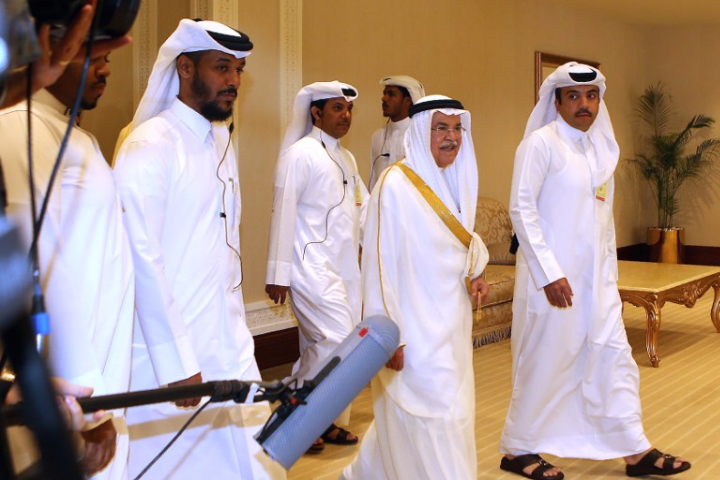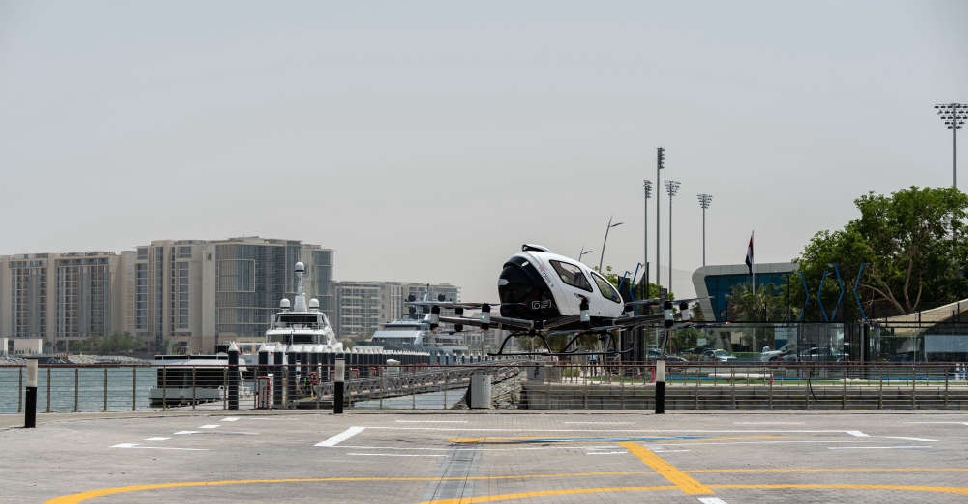
Oil tumbled by the most in two months after output talks Sunday between the world’s biggest producers ended without any agreement on limiting supplies, a diplomatic failure that threatens to renew the rout in prices. Futures fell as much as 6.8 percent in New York, the biggest intraday drop since Feb. 1. The summit in the Qatari capital, which dragged on for more than ten hours beyond its initially scheduled conclusion, finished with no final accord. Discussions stumbled after Saudi Arabia and other Gulf nations wouldn’t agree to any deal unless all OPEC members joined including Iran, which wasn’t present at the meeting, Russian Energy Minister Alexander Novak told reporters. “The market has been so heavily positioned for a deal to go through,” Angus Nicholson, an analyst at IG Ltd. in Melbourne, said by phone. “The change of tone from the Saudis, particularly driven over the last few weeks by Deputy Crown Prince Mohammed bin Salman, has been quite a surprise to the market.” West Texas Intermediate for May delivery lost as much as $2.75 to $37.61 a barrel on the New York Mercantile Exchange and was at $38.03 at 6:54 a.m. Hong Kong time. The contract fell $1.14, or 2.8 percent, to $40.36 on Friday, the biggest decline in almost two weeks. Brent for June settlement dropped as much as $3, or 7 percent, to $40.10 a barrel on the London-based ICE Futures Europe exchange. The contract lost 74 cents, or 1.7 percent, to $43.10 on Friday. The global benchmark was at a $1.17 premium to WTI for June. Oil ministers from 16 nations, representing about half the world’s output, gathered in the Qatari capital in a bid to stabilize the global market, the first significant attempt at coordinating oil output between the Organization of Petroleum Exporting Countries and nations outside the group in 15 years. There were significant hurdles to any deal after Saudi Arabia’s Deputy Crown Prince said the kingdom wouldn’t restrain its production without commitments from other major producers including Iran, which has ruled out freezing for now. Tense Negotiations Forty traders and analysts surveyed by Bloomberg last week were evenly split on whether a consensus would be reached, and tensions were visible throughout the negotiations. While analysts doubted that any accord would have a significant impact on the global oil surplus, the group’s inability to agree undermines any prospect of coordinated action to solve the market slump. Russia was surprised there wasn’t an agreement, said Novak. Officials from Saudi Arabia, Qatar, Venezuela and Russia -- who initiated the push for a freeze in February -- agreed to a draft accord on Saturday, but some countries changed their position right before the summit the following day, leading to “hot discussions,” he said. A freeze could have sped up the rebalancing of the market by six months, which may now take until mid-2017, Novak said in a press conference after the talks. The “door is not closed” to a future accord, although “Russia won’t be as optimistic as before,” he said. Saudi Obstacle OPEC members will consult among themselves and with other oil producers until June, Qatar’s Energy Minister Mohammed Al Sada said at news conference after the meeting. The next scheduled bi-annual OPEC meeting is on June 2. “If all major producers don’t freeze production, we will not freeze production,” Saudi Arabia’s Deputy Crown Prince said in an interview April 14. “If we don’t freeze, then we will sell at any opportunity we get.” The world’s largest oil exporter could increase output to 11.5 million barrels a day immediately and go to 12.5 million in six to nine months "if we wanted to," the prince said. The kingdom pumped 10.2 million barrels a day last month, according to data compiled by Bloomberg. Iran, which is reviving oil exports after international sanctions were lifted in January, ruled out any limits on its output before reaching pre-sanctions levels, dismissing the notion of joining the freeze as “ridiculous.” The nation’s Oil Minister Bijan Namdar Zanganeh said Saturday he wouldn’t attend the Doha talks and won’t be a signatory to any deal as it would amount to self-imposed sanctions. “The fact that Saudi Arabia seems to have blocked the deal is an indicator of how much its oil policy is being driven by the ongoing geopolitical conflict with Iran,” said Jason Bordoff, director of the Center on Global Energy Policy at Columbia University and a former White House official. (By Elena Mazneva, Wael Mahdi and Mohammed Aly Sergie/Bloomberg, with assistance from Elliott Gotkine, Dina Khrennikova, Grant Smith, Javier Blas, Nayla Razzouk and Stephen Stapczynski.)
 Elon Musk visits China as Tesla seeks self-driving technology rollout
Elon Musk visits China as Tesla seeks self-driving technology rollout
 Abu Dhabi Airports welcomes 6.9 million passengers in three months
Abu Dhabi Airports welcomes 6.9 million passengers in three months
 ByteDance denies media report of plan to sell TikTok
ByteDance denies media report of plan to sell TikTok
 Photos: UAE’s first operational vertiport unveiled in Abu Dhabi
Photos: UAE’s first operational vertiport unveiled in Abu Dhabi
 France's air traffic control strikes ground flights across Europe
France's air traffic control strikes ground flights across Europe




